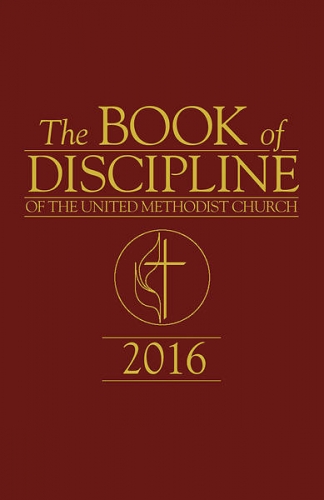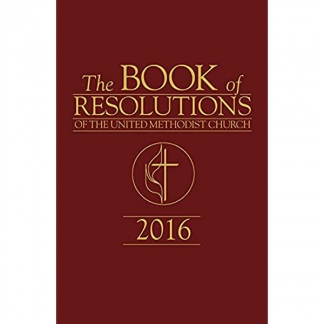news article
How the United Methodist Church supports dismantling racism
February 10, 2021 / By UNY Conference Council on Religion & Race
Editor's Note: This article originally appeared in Issue 4 of the 2020 Advocate, which focused on the theme of dismantling racism. Click here to read the Advocate.
Dismantling racism has been a critical part of the United Methodist Church’s social principles. While the Book of Discipline and the Book of Resolutions have dozens of paragraphs that mandate the importance of dismantling racism, we chose some that may most resonate with the Upper New York Conference and its focus on Imagining no Racism!
The Book of Discipline, The Constitution, Paragraph 5, Article V. Racial Justice:
The United Methodist Church proclaims the value of each person as a unique child of God and commits itself to the healing and wholeness of all persons. The United Methodist Church recognizes that the sin of racism has been destructive to its unity throughout its history. Racism continues to cause painful division and marginalization. The United Methodist Church shall confront and seek to eliminate racism, whether in organizations or in individuals, in every facet of its life and in society at large. The United Methodist Church shall work collaboratively with others to address concerns that threaten the cause of racial justice at all times and in all places.
Paragraph #6024 on page 525 in the Book of Resolutions: “We, the General Conference, affirm that all peoples and individuals constitute one human family, rich in diversity. ‘So now you are no longer strangers and aliens. Rather, you are fellow citizens with God’s people, and you belong to God’s household’.” (Ephesians 2:19).
The Book of Resolution Paragraph 162, pages 133-34: Paragraph 162. III The Social Community:
p. 133: A) Rights of Racial and Ethnic Persons- Racism is the combination of the power to dominate by one race over other races and a value system that assumes that the dominant race is innately superior to the others. Racism includes both personal and institutional racism. Personal racism is manifested through the individual expressions, attitudes, and/or behaviors that accept the assumption of a racist value system and that maintain the benefits of this system. Institutional racism is the established social pattern that supports implicitly and explicitly the racist value system. Racism, manifested as sin, plagues and hinders our relationship with Christ, in so much as it is antithetical to the gospel itself.
p. 134: Therefore, we recognize racism as sin and affirm the ultimate and temporal worth of all persons. We rejoice in the gifts that particular ethnic histories and cultures bring to our total live. We commit as the Church to move beyond symbolic expressions and representative models that do not challenge unjust systems of power and access.
The Book of Resolutions Paragraph 1025 Pages 55-61 on Environmental Racism:
[p. 56] Not only are people of color differently impacted by toxic waste and contamination, they can expect different responses from the government when it comes to building resilience after an environmental disaster or remediation. This can be clearly seen during and after Hurricane Katrina and Hurricane Sandy, and in the toxic remediation efforts on Dickson County, Tennessee. People of color and communities of color receive sluggish attention to their concerns. It appears that neither existing environmental, health, and civil rights laws, nor local local land use controls have been adequately applied or adapted toward the reduction of health risks or the mitigation of various adverse impacts to families living in or near toxic "hot spots", which disproportionately house people of color.
Despite the clear evidence and growing awareness of the consequences to everyone's health from toxic dumping, our society's attitude towards the production and disposal of hazardous products is one of "out of sight, out of mind". But "out of sight, out of mind" is most often where the poor and those rendered powerless live and work. These communities have thus become toxic "sacrifice zones." In short, environmental protection systems are broken, extraordinarily slow to respond and/or fail to provide equal protection to people of color and low income communities. (Editor’s Note: people of color are not capitalized in these quotes, although we do that now).
Therefore be it resolved, [p. 59-60]
- The UMC, through its Act of Repentance in Annual Conferences and in the Church with native peoples develop respectful, honoring relationships with native peoples and ask the Church to repent of the ways its well-intentioned followers devalued and disrespected native peoples' deep spirituality and care for the land that sustains us all. It was this deep disrespect that justified the genocide of hundreds of thousands of native peoples in the name of Christianity. We ask that when native peoples' lands are hurt today by power plants, mining (including coal, gold, copper, coltan, uranium), and garbage dumps (including nuclear waste) or access to clean water that the Church diligently work to reverse the damage and work to ensure that the right of indigenous populations to free, prior and informed consent (FPIC) are transparently honord.
- The UMC to advocate for jobs in low income areas that are good for the environment and that help eliminate pollutants, toxins, untested chemicals, and greenhouse gasses. Jobs should also maximize energy efficiency and renewable forms of energy. We call on the UMC to ensure that communities currently suffering from economic deprivation are among the first that are hired and trained for these jobs.
We urge the people called United Methodists to....
- Stand in solidarity with environmental justice movements led by people of color and native peoples who have been adversely impacted by the environmental toxins in their
 neighborhoods.
neighborhoods.
The Book of Resolutions Paragraph 3371 on pages 349-352: A Charter for Racial Justice in an Interdependent Global Community
…. Therefore, as United Methodist in every place across the land, we will unite our efforts within the Church to take the following actions:
- Eliminate fall forms of institutional racism in the total ministry of the Church, giving special attention to those institutions that we support, beginning with their employment policies, purchasing practices, environmental policies, and availability of services and facilities;
- Create opportunities in local churches to deal honestly with the existing racist attitudes and social distance between members, deepening the Christian commitment to be the church where all racial groups and economic classes come together.
…
- Establish workshops and seminars in local churches to study, understand and appreciate the historical and cultural contributions of each race to the church and community.
- Raise local churches’ awareness of the continuing needs for equal education, housing, employment, medical care, and environmental justice for all members of the community and to create opportunities to work fort these things across racial lines.
The Book of Resolutions Paragraph #3374 pages356-7: Annual Conferences’, Districts’, and Local Congregations’ Responsibilities for Eradication of Racism
Therefore, be I resolved that every Annual Conference, District and local congregation within the United States develop and implement a strategy and program to educate and support systemic and personal changes to end racism and work multi-culturally, and
Be it further resolved that an educational program which will include understanding systemic racism, a strategy for its eradication, appreciation and valuation of diversity and guidelines for working with different groups in communities toward becoming an inclusive church be offered at least yearly within the annual conference, and
Be it further resolved. That all clergy and lay leadership be encouraged to participate in such programs and that all newly ordained clergy be required to participate in these programs,
…..
The Book of Resolutions Paragraph 3378 pages 361-2: Racism and Economic Injustice Against People of Color in the US
Biblical quotes used in this Resolution:
“Woe to those who make unjust laws, to those who issue oppressive decrees, to deprive the poor o their rights and withhold justice from the oppressed of my people” (Isaiah 10:1-2a NIV).
“The spirit oft he Lord is upon me, because he had anointed me to bring good news to the poor. He has sent me to proclaim release to the captives and recovery of sight to the blind, and to let the oppressed go free.” (Luke 4:18 NRSV)
“Look, you serve your own interest on your fast day, and oppress all your workers. Look, you fast only to quarrel and to fight and to strike with a wicked fist. Such fasting a you do today will not make your voice heard on high…. Is not this the fast that I choose: to lose the bonds of injustice, to undo the thongs of the yoke, to let the oppressed go free, and to break every yoke? Is it not to share your bread with the hungry, and bring the homeless poor into your house; when you see the naked, to cover them, and not to hide yourself from your own kin.” (Isaiah 58: 3b-4, 6-7 NRSV)